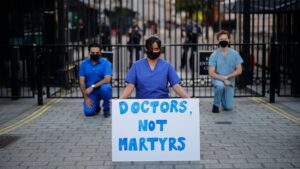Only two years after the NHS was founded in 1948, GPs first demanded an increase to their salaries — and threatened to withdraw their labour from the service entirely if those demands weren’t met. Many of the doctors involved in the proposed industrial action had, they complained, “suffered financial hardship”; all felt that their status in society had rapidly deteriorated since the establishment of the NHS. They had ceased to be elite practitioners of an ancient craft, becoming instead mere salaried members of the welfare state.
In the end, no withdrawal of labour came to pass in 1950; but today, more than 75 years on, their arguments are being echoed by the junior doctors who have been on strike since last Wednesday. Their central demand is a restoration of pay to pre-austerity levels. But the question of how much doctors ought to be paid has hung over our National Health Service since its inception. Every couple of years or so, in the second half of the 20th century, the pages of the British Medical Journal were filled with new complaints about remuneration. In 1956, for example, Dr A. E. Loden of Tunbridge Wells threw up his hands, suggesting that all junior doctors should resign from the NHS and offer their services directly to patients in exchange for £5 per annum. Will this fraught question ever be answered?
Various governments have, over the years, made attempts. In 1957, a Royal Commission was established; it concluded that increased salaries would not attract more young people to medicine, or dissuade existing NHS staff from emigrating — whereas today, the BMA insists that pay rises are essential to retain doctors. However, it did concede that doctors’ pay was too low in comparison with other professional salaries, suggesting an increase of 22%. Harold Wilson’s government actually improved on this, increasing doctors’ and dentists’ salaries by up to 30%. This infuriated unions representing blue-collar workers.
The Commission also recommended the establishment of a permanent, impartial Review Body that would advise the government on NHS staff pay. This was set up in 1962 — and its goals were lofty. It would prevent pay disputes from disrupting the work of the NHS through even-handed analysis of data. It would assure the taxpayer that doctors weren’t earning too much, particularly at times of national economic hardship. It would guarantee that salaries wouldn’t become a manifesto talking point. Its very existence was supposed to thwart the politicisation of NHS pay.
Needless to say, these goals weren’t entirely realised. During the Sixties, the British Medical Association repeatedly campaigned to increase doctors’ salaries, arguing that low pay was eroding staff morale; in 1966 the Guardian reported that up to 500 doctors were leaving the UK and Ireland every year in search of better remunerated posts elsewhere, a narrative that has persisted to this day. And in the Seventies, both junior doctors and consultants engaged in industrial action for the first time. Between January and April of 1975, consultants suspended all “goodwill activities” — that is, non-emergency care — in response to the Labour government’s pledge to abolish “pay beds” (the practice of providing private care in NHS hospitals, and a way for consultants to supplement their income). Their action was called off when then health secretary Barbara Castle backtracked. To this day, NHS consultants being permitted to carry out private practice remains an “essential part of the flexibility and freedom built into national contracts”, according to the BMA.
While the majority of NHS doctors support the current industrial action, the strikes of the Seventies — with junior doctors walking out in November 1975 — were more controversial. Many doctors found the idea of withdrawing their labour troubling, forcing them to confront the fundamental question of what, if anything, makes medicine different from other jobs — and whether it is ethical for those in the business of saving lives to take industrial action.
Patient safety has always been the most contentious sticking point. In 2016, the then health secretary Jeremy Hunt proposed new contracts for junior doctors, scrapping overtime rates while increasing their basic pay. Hunt insisted this would be cost neutral; the BMA argued that it would mean a relative pay cut of up to 40%. Hunt eventually admitted that those who worked longer than 56 hours a week would face an overall fall in pay, but the Conservative government refused to back down, so in April 2016, junior doctors, for the first time ever, withdrew their labour from emergency care as well as routine. NHS England’s medical director Bruce Keogh warned in The Observer that junior doctors might “irreparably damage” the reputation of the profession. Ultimately, industrial action was called in the September after some junior doctors expressed concern about patient safety. It took until 2018 for the government and the BMA to agree on a new contract.
But it seems that neither establishment can make history of this seemingly endless dispute. Now, as a six-day strike approaches its end, the BMA is arguing that between 2008 and 2022, junior doctors’ salaries fell by 26%, once rising costs are taken into account. Comparisons between doctors’ pay and that of other workers have also been a major feature of this latest bout of strike action — but unlike in the Fifties and Sixties, when medicine was being compared to fields that required similar levels of training, like law, doctors’ pay is now being juxtaposed with that of baristas. Back in March 2023, the BMA launched an advertising campaign that stated:
“Pret a Manger has announced it will pay up to £14.10 per hour. A junior doctor makes just £14.09. Thanks to this Government you can make more serving coffee than saving patients. This week junior doctors will take strike action so they are paid what they are worth.”
Most of us can understand why doctors might expect to earn more than baristas, but nevertheless, the language of this campaign is off-putting. It has been criticised by both doctors themselves and other trade unionists as elitist and simplistic: it fails to recognise the vastly different earning potential and social status of the two professions.
Comparing doctors’ pay with that of other professions is a tactic that has, over the years, been used by critics of strikes as well as their supporters. In 1965, economist Brian Abel-Smith felt squeamish about pay rises for doctors, claiming that young GPs were already paid “much more than their contemporaries in other occupations”. He was right: mid-century, doctors were very well paid. In the Seventies, the full-time salary of a consultant was between £7,500 and £10,700; a full-time manual worker earned around £2500. Some senior hospital doctors were taxed at the top rate, which applied only to incomes over £20,000.
It might seem strange that this period of affluence was also the first time NHS doctors participated in industrial action. But something else was happening in the Seventies, too: the public was starting to fall in love with the NHS and doctors were starting to reinvent themselves, capitalising on the new affection for their employer. Today, there are echoes, with some striking doctors holding up signs saying “claps won’t pay my bills” — referencing the outpouring of love for the NHS during the pandemic. But doctors have a much stronger argument now. It’s difficult to deny that their pay has been eroded in real terms.
But doctors aren’t a monolith. There have always been some who are sceptical that pay rises are useful or even moral — especially when other members of the NHS workforce earn so much less. “I need my nursing colleagues,” a consultant in the mid-Eighties said. “Such disparity in salary scales makes me ashamed.” In the mid-Seventies, at a time of widespread poverty and unemployment, Dr W. J. Abel suggested it was “surely fairly evident to any intelligent being that we are facing major problems in our world. Is it not reasonable to suggest that we should all live more simply?” In the early Eighties, a pair of doctors wrote to the BMJ to argue that their colleagues should forgo any pay rises, “while there is so much hardship among the unemployed”.
The same argument that is sometimes used to justify doctors being paid more than baristas — they save lives — is also used to justify why they should forgo high wages: they are supposed to be self-sacrificing, driven by a sense of vocation. If it is easy for some to sympathise with doctors, as public servants, it is harder for others, who might see medics as generally privileged, wealthy and vaunted professionals. This dichotomy exists partly because both views of their profession can benefit doctors; it isn’t in their interests to let go of either entirely.
For now, public support for doctors, even striking ones, remains remarkably high — but public opinion is fickle, and it is possible that a focus on pay during industrial action makes medics vulnerable to media and political critique. During the 2016 junior doctors’ strike, the Daily Mail repeatedly ran such headlines as “Luxury holidays of the junior doctors leading this week’s NHS strike”. They continued this tactic last year, running the story of the “striking junior doctor” who “owns a £500,000 flat with no mortgage and is a director at his family’s investment firm”. But if anything, the BMA seems to be focusing more on pay this time around than they did in 2016 — when the trade union framed their demands more in terms of patient safety.
Of course, trade unions know that campaigning around salaries is legible to the public: everyone can relate to the feeling of being undervalued, and it makes the success of their industrial efforts measurable. A pay rise means they’ve won. But whether it will actually improve the working lives of doctors — or the functioning of the NHS — is far less certain. Money, or lack thereof, does not get to the heart of what makes being a doctor difficult in today’s NHS. Bigger salaries won’t substantially improve their health, happiness, or wellbeing. It won’t make it easier for them to book annual leave for their own weddings; it won’t address rampant bullying and harassment; it won’t bring back the spaces where they could once rest and socialise, which have been slowly stripped from UK hospitals.
Like the Royal Commission in the Fifties, I’m sceptical that it will meaningfully improve recruitment and retention. It won’t do anything for decrepit infrastructure or woefully outdated IT. It won’t repair collapsed social care. It also won’t address inequity in patient care or outcomes. It won’t correct damaging power imbalances between doctors and patients, or eradicate medical gaslighting.
None of this is to say that the current strike action being undertaken by doctors is unnecessary or inappropriate, or that healthcare professionals don’t deserve to be paid more than they are now. But it’s safe to say that, as history has suggested, even if they do get the money they’re after, a pay rise is unlikely to satisfy them. Their plight is the same as their employer’s: extra funding alone won’t fix it. The NHS, and the people that work in it, need things that are harder to give, and harder to measure, than cash: attention, good leadership, a vision for the future, hope. Otherwise this cycle of grievance will continue, an inevitable, recurring part of our health service’s history.
Disclaimer
Some of the posts we share are controversial and we do not necessarily agree with them in the whole extend. Sometimes we agree with the content or part of it but we do not agree with the narration or language. Nevertheless we find them somehow interesting, valuable and/or informative or we share them, because we strongly believe in freedom of speech, free press and journalism. We strongly encourage you to have a critical approach to all the content, do your own research and analysis to build your own opinion.
We would be glad to have your feedback.
Source: UnHerd Read the original article here: https://unherd.com/




